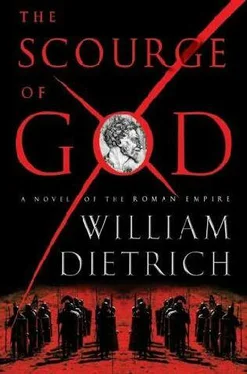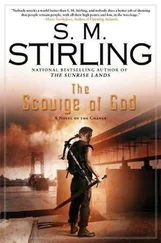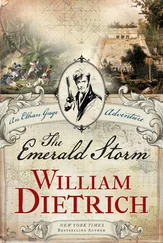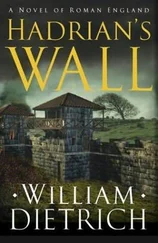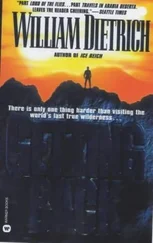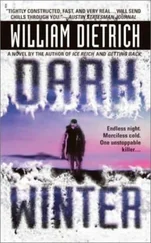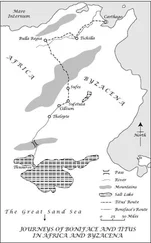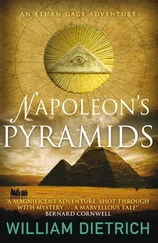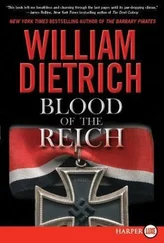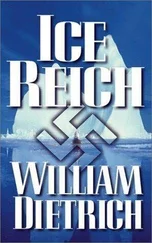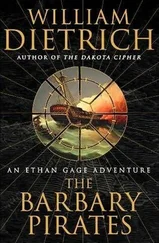William Dietrich - The Scourge of God
Здесь есть возможность читать онлайн «William Dietrich - The Scourge of God» весь текст электронной книги совершенно бесплатно (целиком полную версию без сокращений). В некоторых случаях можно слушать аудио, скачать через торрент в формате fb2 и присутствует краткое содержание. Жанр: Фэнтези, на английском языке. Описание произведения, (предисловие) а так же отзывы посетителей доступны на портале библиотеки ЛибКат.
- Название:The Scourge of God
- Автор:
- Жанр:
- Год:неизвестен
- ISBN:нет данных
- Рейтинг книги:5 / 5. Голосов: 1
-
Избранное:Добавить в избранное
- Отзывы:
-
Ваша оценка:
- 100
- 1
- 2
- 3
- 4
- 5
The Scourge of God: краткое содержание, описание и аннотация
Предлагаем к чтению аннотацию, описание, краткое содержание или предисловие (зависит от того, что написал сам автор книги «The Scourge of God»). Если вы не нашли необходимую информацию о книге — напишите в комментариях, мы постараемся отыскать её.
The Scourge of God — читать онлайн бесплатно полную книгу (весь текст) целиком
Ниже представлен текст книги, разбитый по страницам. Система сохранения места последней прочитанной страницы, позволяет с удобством читать онлайн бесплатно книгу «The Scourge of God», без необходимости каждый раз заново искать на чём Вы остановились. Поставьте закладку, и сможете в любой момент перейти на страницу, на которой закончили чтение.
Интервал:
Закладка:
The fortifications were the thickest Edeco had ever seen.
“You will have to leave your horse outside the city,” the translator added.
This, at least, got a response. The Hun peered down. “I will ride to the palace.”
“No one rides in Constantinople except the emperor,” Bigilas insisted. “It’s too crowded. It would frighten your horse.” The Huns lived on horseback, he knew. They fought there, parleyed there, ate there, sometimes slept there, and for all he knew they made love there. They’d ride a hundred paces if it would save them a walk, and fitted their mounts so easily that they seemed a single beast. They also had to be manipulated like petulant children. “If you’d prefer, I can call a litter.”
“A litter?”
“A couch, carried by slaves. You can ride that way.” Edeco sneered. “Like a baby or a woman?”
“It is three miles to the palace.” He looked deliberately at the Hun’s bandy legs.
The Hun scowled. “What did you do to get here?”
“I walked. Even our senators and generals walk, ambassador. It will make it easier for me to show you the glories of our capital.”
The Hun shook his head. “Why live where you can’t ride?” But he slid off his pony anyway, not as surprised as he pretended. Previous envoys had warned him that if he allowed it, his horse would be stabled outside the city in a box just like the Romans lived in, a confinement that would make the pony fat and weak. These were an insect people, and they swarmed in their cities like maggots. The trick was to get your presents and get out.
Bigilas was pleased the Hun was not making an issue of his horse. It was an unexpected characteristic of these slaughterers that they would actually negotiate. He had begun to learn their tongue when taken captive in Attila’s raid of seven years before, and after being ransomed he had learned more when his skill won him jobs as a trader. His ability to translate had brought him to the attention of the imperial government and eventually to Chrysaphius himself.
Bigilas knew the Huns without liking them, which was just the quality the chief minister wanted.
The translator watched the Hun give his reins, bow, and quiver to an attendant he called Skilla. Edeco instructed the young man and another ranking Hun, a Roman-born lieutenant and turncoat named Onegesh, to wait outside the walls. If he did not return when expected, they were to report to Attila. “Do not let them box my horse and do not let them box you. It will cost you strength.”
“But we’ve arranged a villa and stables,” Bigilas said.
“Our roof is the stars,” the young man replied just a little too proudly. Skilla, like his uncle Edeco, was looking at the triple walls of Constantinople with a mixture of contempt and envy. “We will camp at the river and await you there.” Chrysaphius wouldn’t like the Huns keeping to themselves, outside Roman control, but what could Bigilas do?
“Do you want food?”
“We will get what we need.”
What did that mean? Were they going to poach from farms, steal from pilgrims? Well, let them sleep in the dirt.
“Come then,” he said to Edeco. “Chrysaphius is waiting.” As they walked to the great gate he looked back at the two Huns left behind. They appeared to be counting the towers.
The new capital of the Eastern Roman Empire was a triangle, the apex that jutted into the water containing the imperial palaces, Hippodrome, and the church of Hagia Sophia. The triangle’s base, to the west, was the four-mile-long triple wall. The two watery sides of the triangle were also walled and lined with artificial harbors crowded with shipping. All of the world’s commerce now seemed to pass through this funnel; and the Eastern emperors had imported statues, art, marbles, and mosaics to give their new city instant re-spectability. There were probably as many Romans in Constantinople as there were Huns in the entire world, Bigilas knew; and yet it was the city that paid tribute to the barbarian, not the other way around. It was an intolerable situation that must come to an end.
The Golden Gate was a triple archway, the arch in the center being the highest and broadest; and its wood-and-iron doors were reinforced with a relief of enormous brass elephants polished to a golden sheen. The portal passed through all three walls in a tunnel that would be a corridor of massacre for any army that broke through: Its ceiling was peppered with kill holes through which arrows could be shot or hot oil poured. Moreover, the third and innermost wall was the highest so that each barrier overlooked the one in front, giving the appearance of a forbidding mountain range.
Edeco stopped just short of the outer entrance, peering up at statues of emperor, victory, and fortune. There was Latin lettering above. “What does it say?” Bigilas read aloud: “‘Theodosius adorns this place, after the doom of the usurper. He who constructed the Golden Gate brings in the Golden Age.’”
The barbarian was silent a moment. Then, “What does it mean?”
“That our emperor is a god and that this is the new center of the world.”
“I thought you Romans only had one god, now.”
“I suppose.” The translator frowned. “The divinity of the emperor is still under theological debate.” The Hun grunted, and they passed through the darkness of the triple walls to the bright sunlight on the inside. Edeco stopped again. “Where is your city?” Bigilas smiled. Here the immensity of Constantinople first struck the barbarians. “The central city remains behind the original walls of Constantine.” He pointed at a wall nearly a mile ahead. “This new area, walled by Theodosius, is reserved for cisterns, gardens, monasteries, churches, and farmers’ markets. The Lycus River flows under our walls and we have enough water and food to resist an invader forever. Constantinople can never be starved or conquered, Edeco, it can only be befriended.” The Hun said nothing for a while, his gaze rotating. Then,
“I come as a friend. For presents.”
“The chief minister has presents for you, my friend.” At the smaller, older, single-width wall of Constantine there was a marketplace before the Gate of Saturninus where Edeco eyed the goods with a predator’s appetite. Nova Roma had become the world’s new crossroads and every product, every pleasure, every smell, and every taste could be found here. His wives would quiver like excited geese to see booty such as this. Someday he would carry it back to them, spattered with the blood of the merchants who had owned it. The thought pleased him.
The pair went through the gate and entered the urban hub of the Eastern Empire, a raw, bustling capital of gilded churches, ostentatious palaces, crowded tenements, and teeming streets. Edeco suddenly felt shrunken and entirely too anonymous. If the Hun evoked fear outside the walls, he elicited only curious glances inside them. To Constantinople came all the peoples of the world: black Africans, blond Germans, dusky Syrians, shrouded Berbers, migratory Jews, glowering Goths, copper-hued Iberians, industrious Greeks, proud Arabs, clamoring Egyptians, and bumpkin Illyrians and Dacians. They pushed, threaded, and jostled one another, crying out bargains, negotiating prices, shouting for passageway, and promising pleasure. The Hun felt caught in a vast river he did not control. There was a heady stench of spice, perfume, sweat, charcoal smoke, food, and sewage and a cacophony of tongues. It made him want to vomit.
Bigilas was gesturing to it all with pride.
The road they followed was stone, that Roman custom that Edeco believed was hard on feet and harder on hooves.
The middle was open to the sky but on either side was a marble portico that offered shade and shelter and was just as crowded as the lane’s center. The tops of the pillars were carved into fronds and leaves, as if to mimic trees. The Romans used rock instead of wood and then tried to make the rock look like wood! In the shadows beyond the portico was an endless line of shops tunneling into buildings so high that they made the street a canyon. The Hun could not keep himself from scanning the eaves, wary of ambush, and yet these Romans thronged without any apparent feeling of entrap-ment. In fact, they seemed to take comfort in this closeness.
Читать дальшеИнтервал:
Закладка:
Похожие книги на «The Scourge of God»
Представляем Вашему вниманию похожие книги на «The Scourge of God» списком для выбора. Мы отобрали схожую по названию и смыслу литературу в надежде предоставить читателям больше вариантов отыскать новые, интересные, ещё непрочитанные произведения.
Обсуждение, отзывы о книге «The Scourge of God» и просто собственные мнения читателей. Оставьте ваши комментарии, напишите, что Вы думаете о произведении, его смысле или главных героях. Укажите что конкретно понравилось, а что нет, и почему Вы так считаете.
